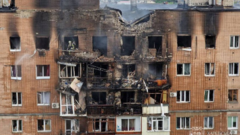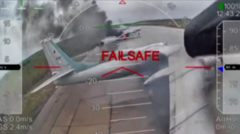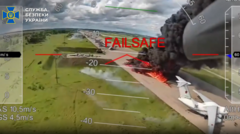Tatyana Popovytch, along with many other relatives of the 16,000 missing civilians in Russian prisons, share their struggles and experiences finding their loved ones amid the ongoing conflict in Ukraine.
Families of Ukraine's Captured Civilians Fear for Their Loved Ones as Peace Talks Progress

Families of Ukraine's Captured Civilians Fear for Their Loved Ones as Peace Talks Progress
As peace talks advance, families of Ukrainian civilians missing in Russian captivity worry they will be forgotten.
With hopes rising for a resolution to the war, families of captured civilians in Ukraine express fears that their loved ones may be overlooked in peace negotiations. Tatyana Popovytch has tirelessly searched for news of her son Vladislav, who was abducted during the conflict. After receiving fragmented communication about his status from other prisoners, her emotional distress deepens with peace talks unfolding.
The situation is complicated by the fact that there is no formal process for the return of captured civilians, unlike the mechanisms set up for prisoners of war. According to Ukrainian human rights officials, nearly 16,000 civilians remain in Russian detention, plus over 20,000 children believed to have been taken across the border. Families like Yulia Hripun's, whose father was kidnapped early in the war, have taken initiatives to advocate for the return of these civilians but face significant uncertainty.
Officials express concerns over the lack of legal frameworks or processes that could facilitate the return of detained civilians. Human rights ombudsman Dmytro Lubinets emphasized the absence of a clear path for resolving the issue. Moreover, as Russia levies charges against captured civilians, it further complicates negotiations for their return.
Amidst these challenges, family members remain in limbo, hoping for reunification while grappling with the psychological toll of prolonged separation. They live with the fear that, as negotiations proceed, their loved ones may slip further from reach, all while mourning the events missed during their absence. Tatyana shares her constant mental preparation for her son's potential return, aware that the emotional journey will be fraught with complexities.
As the war continues and peace talks evolve, the plight of the families resonates as a haunting reminder of the human cost of conflict, caught between hope and harrowing uncertainty.
The situation is complicated by the fact that there is no formal process for the return of captured civilians, unlike the mechanisms set up for prisoners of war. According to Ukrainian human rights officials, nearly 16,000 civilians remain in Russian detention, plus over 20,000 children believed to have been taken across the border. Families like Yulia Hripun's, whose father was kidnapped early in the war, have taken initiatives to advocate for the return of these civilians but face significant uncertainty.
Officials express concerns over the lack of legal frameworks or processes that could facilitate the return of detained civilians. Human rights ombudsman Dmytro Lubinets emphasized the absence of a clear path for resolving the issue. Moreover, as Russia levies charges against captured civilians, it further complicates negotiations for their return.
Amidst these challenges, family members remain in limbo, hoping for reunification while grappling with the psychological toll of prolonged separation. They live with the fear that, as negotiations proceed, their loved ones may slip further from reach, all while mourning the events missed during their absence. Tatyana shares her constant mental preparation for her son's potential return, aware that the emotional journey will be fraught with complexities.
As the war continues and peace talks evolve, the plight of the families resonates as a haunting reminder of the human cost of conflict, caught between hope and harrowing uncertainty.





















